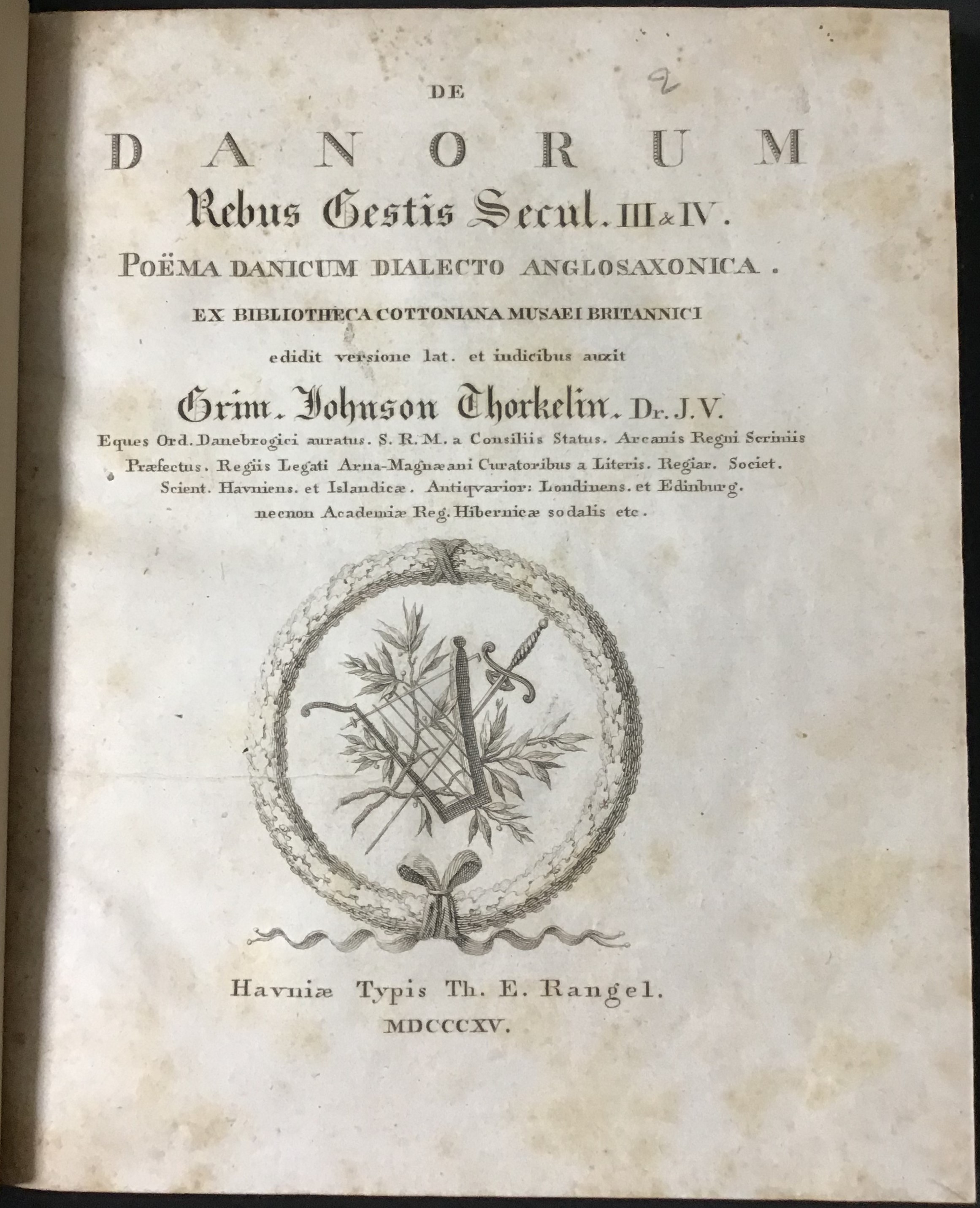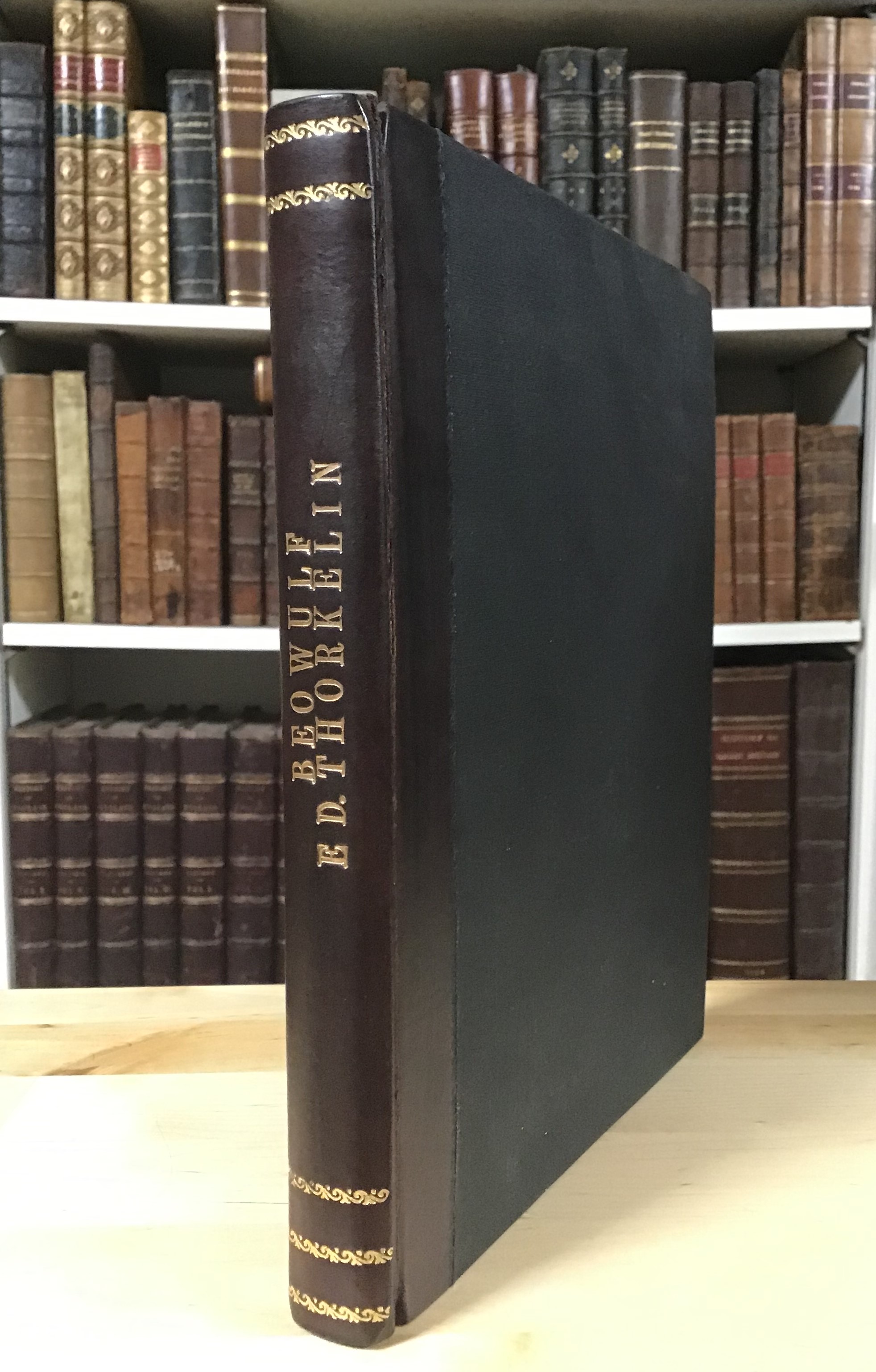Thorkelin's Beowulf (1815)
Grímur Jónsson Thorkelin, De Danorum rebus gestis secul. III et IV. Poëma Danicum dialecto Anglosaxonica (Copenhagen, 1815).

This is the editio princeps of the Old English poem Beowulf including the first (Latin) translation of the poem published by Grímur Jónsson Thorkelin (1752-1829) in 1815. Due to the poor quality of this edition, it is generally agreed that Thorkelin was not competent enough as an editor of Old English poetry even by the standard of those days. Perhaps Thorkelin himself was somewhat aware of the fact, which Fjalldal argues may well be one of the reasons why it took him as many as 29 years to publish it after transcribing the text at the British Museum in 1787. A series of negative reviews were published after its publication, and the edition greatly compromised the editor’s scholarly reputation. In the preface of the second oldest edition of the poem published in 1833, the editor, J. M. Kemble, writes that “I am therefore most reluctantly compelled to state that not five lines of Thorkelin’s edition can be found in succession, in which some gross fault either in the transcript or the translation, does not betray the editor’s utter ignorance of the Anglo-Saxon language” (xxix). All these and other critical assessments notwithstanding, the fact remains that it is a monumental work in the history of Beowulf studies, and it is nice to have an actual copy at hand (even though I rarely consult it).
Thorkelin was born in Iceland in 1752, but moved to Copenhagen in 1770, where he studied law and published two editions/translations of Old Norse canonical laws. In 1786, he visited Britain in the hope of discovering documents related to the history of Denmark. The young Thorkelin seems to have wanted to secure his promised position as the next Keeper of the Royal Privy Archives by making some important discovery related to the Danish history, probably having in mind the achievements by a former Keeper of the Royal Privy Archives, Jacob Langebek (1710-1775), who travelled across Sweden and the Baltic states, collected historical documents relevant to the Danish history, and published them as The Langebekske Diplomatarium.
It is not clear whether Thorkelin knew of Beowulf before his visit to Britain, but he mentions the poem in a letter dated 3 November 1786, some months after his arrival in Britain, in which he describes the poem as 'a collection of songs about the achievements of Danish kings in the third century' (Fjalldal 323). Although his understanding of the poem was wrong, he was aware of its importance, and in 1787, he asked James Matthews, a British Museum employee, to transcribe the manuscript text, while he himself also transcribed it a few years later.
It took him very long to edit the poem; he eventually published it about 29 years after the first transcription was made. It is not clear why it took so long, but he makes an excuse in the preface, writing that his house in Copenhagen was burnt down in 1807 during the British-Danish war, and the manuscript of his edition nearly finished was lost, and so he needed to repeat all the editorial process from the very beginning, using the two transcripts, which survived the fire. Some scholars would believe it, while others are sceptical. Fjalldal, for instance, writes that 'it is rather difficult to picture Thorkelín having had time and opportunity to rescue his precious transcripts from the fire while his translation and editorial notes - presumably as close at hand and hardly very bulky - were left to be destroyed by the flames' (328).
For further information about Thorkelín and his edition of Beowulf, see K. S. Kiernan, 'Part One: Thorkelin's Discovery of Beowulf', in The Thorkelin Transcripts of 'Beowulf', Anglistica 25 (Copenhagen: Rosenkilde and Bagger, 1986), pp. 1-41; Magnús Fjalldal, 'To Fall by Ambition – Grímur Thorkelín and his Beowulf Edition', Neophilologus 92 (2008): 321-32; and Robert E. Bjork, 'Grímur Jónsson Thorkelin's Preface to the First Edition of Beowulf, 1815', Scandinavian Studies 68.3 (1996): 291-320. The two transcripts by Thorkelin and his assistant can be consulted at the Electronic Beowulf website.


This is the editio princeps of the Old English poem Beowulf including the first (Latin) translation of the poem published by Grímur Jónsson Thorkelin (1752-1829) in 1815. Due to the poor quality of this edition, it is generally agreed that Thorkelin was not competent enough as an editor of Old English poetry even by the standard of those days. Perhaps Thorkelin himself was somewhat aware of the fact, which Fjalldal argues may well be one of the reasons why it took him as many as 29 years to publish it after transcribing the text at the British Museum in 1787. A series of negative reviews were published after its publication, and the edition greatly compromised the editor’s scholarly reputation. In the preface of the second oldest edition of the poem published in 1833, the editor, J. M. Kemble, writes that “I am therefore most reluctantly compelled to state that not five lines of Thorkelin’s edition can be found in succession, in which some gross fault either in the transcript or the translation, does not betray the editor’s utter ignorance of the Anglo-Saxon language” (xxix). All these and other critical assessments notwithstanding, the fact remains that it is a monumental work in the history of Beowulf studies, and it is nice to have an actual copy at hand (even though I rarely consult it).
Thorkelin was born in Iceland in 1752, but moved to Copenhagen in 1770, where he studied law and published two editions/translations of Old Norse canonical laws. In 1786, he visited Britain in the hope of discovering documents related to the history of Denmark. The young Thorkelin seems to have wanted to secure his promised position as the next Keeper of the Royal Privy Archives by making some important discovery related to the Danish history, probably having in mind the achievements by a former Keeper of the Royal Privy Archives, Jacob Langebek (1710-1775), who travelled across Sweden and the Baltic states, collected historical documents relevant to the Danish history, and published them as The Langebekske Diplomatarium.
It is not clear whether Thorkelin knew of Beowulf before his visit to Britain, but he mentions the poem in a letter dated 3 November 1786, some months after his arrival in Britain, in which he describes the poem as 'a collection of songs about the achievements of Danish kings in the third century' (Fjalldal 323). Although his understanding of the poem was wrong, he was aware of its importance, and in 1787, he asked James Matthews, a British Museum employee, to transcribe the manuscript text, while he himself also transcribed it a few years later.
It took him very long to edit the poem; he eventually published it about 29 years after the first transcription was made. It is not clear why it took so long, but he makes an excuse in the preface, writing that his house in Copenhagen was burnt down in 1807 during the British-Danish war, and the manuscript of his edition nearly finished was lost, and so he needed to repeat all the editorial process from the very beginning, using the two transcripts, which survived the fire. Some scholars would believe it, while others are sceptical. Fjalldal, for instance, writes that 'it is rather difficult to picture Thorkelín having had time and opportunity to rescue his precious transcripts from the fire while his translation and editorial notes - presumably as close at hand and hardly very bulky - were left to be destroyed by the flames' (328).
For further information about Thorkelín and his edition of Beowulf, see K. S. Kiernan, 'Part One: Thorkelin's Discovery of Beowulf', in The Thorkelin Transcripts of 'Beowulf', Anglistica 25 (Copenhagen: Rosenkilde and Bagger, 1986), pp. 1-41; Magnús Fjalldal, 'To Fall by Ambition – Grímur Thorkelín and his Beowulf Edition', Neophilologus 92 (2008): 321-32; and Robert E. Bjork, 'Grímur Jónsson Thorkelin's Preface to the First Edition of Beowulf, 1815', Scandinavian Studies 68.3 (1996): 291-320. The two transcripts by Thorkelin and his assistant can be consulted at the Electronic Beowulf website.
PR
Responses0 Responses
